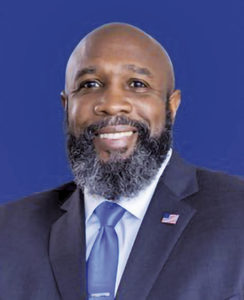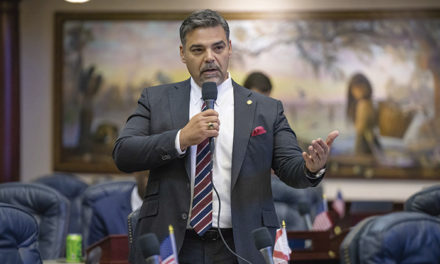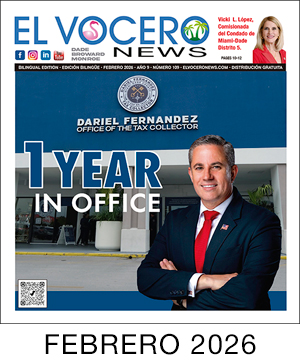By Jesús Hernández
State Representative and general litigation attorney, arbitrator and mediator Christopher Benjamin pursues to be elected for Miami-Dade County judge Group 29.
This election will be held on August 20th.
-What are the good qualities of a judge?
Knowledge, temperament, patience, empathy, and community involvement. Those are qualities we need on every single court.
 -If elected, what would your main duties be?
-If elected, what would your main duties be?
A judge’s duty is to hear the cases that come before them effectively and efficiently, minimizing delay, and to hear the case and be unbiased and ensure that the law is followed. But we also want to rule with compassion and empathy. As a judge, we don’t control the facts and we don’t control the law. Our job is to marry the two, listen to the facts and then apply the law. So, whether someone is guilty or liable is determined by the facts and the law. What we do control is how, in a lot of instances, is how we sentence someone or how we enter a judgment if it’s a civil case. Compassion is more to meter out when you’re talking about criminal cases and making sure that the punishment fits the crime.
-The justice system can be complex. What do you have to say?
Our justice system has guidelines. And the guidelines have a number of factors in it. But in addition to that, we look at two things as we were taught in law school and as we had seen in practice. You look for other aggravating factors. What did the person do that makes this more heinous than usual, or, and or, we look at what did the person do to mitigate the danger that he may have been causing. So, we call these aggravating and mitigating factors. And we look at those things to see how they balance out in this person’s particular case. And so, what’s important for a judge is to make sure that they take each case on their own merit. As a Representative in Tallahassee, we attempted to have a uniform system of bail. So, the bail doesn’t change from county to county. We looked at some of the punishments that we have in the books right now for crimes and whether those punishments should be increased or not. And in some instances, we did increase the punishment for particular crimes. We also increased the requirements in some instances for whether someone should get a bond or not. And we looked at what’s going on with our youth. Because when we talk about violent crimes, a lot of violent crimes in our community, unfortunately, are done by our youth. What should we be doing in terms of limiting them being let go without a sufficient investigation of the case? So, the concern was that too many violent juvenile offenders were being released before a sufficient amount of time to develop all the facts in their case. And so, in that instance, the legislature increased the amount of time for which a juvenile can be held before their final case or before their case is completed.
Rep. Christopher Benjamin: “El deber de un juez es conocer los casos de manera eficaz y eficiente”
Por Jesús Hernández
El representante estatal y abogado litigante general, árbitro y mediador Christopher Benjamin busca ser elegido para el grupo 29 de jueces del condado de Miami-Dade.
Esta elección se llevará a cabo el 20 de agosto.
– ¿Cuáles son las buenas cualidades de un juez?
Conocimiento, temperamento, paciencia, empatía y participación comunitaria. Esas son cualidades que necesitamos en cada tribunal.
-De ser elegido, ¿cuáles serían sus principales funciones?
El deber de un juez es escuchar los casos que se le presenten de manera efectiva y eficiente, minimizando las demoras, ser imparcial y garantizar que se cumpla la ley. Pero también queremos juzgar con compasión y empatía. Como juez, no controlamos los hechos y no controlamos la ley. Nuestro trabajo es unir ambas cosas. Escuchar los hechos y luego aplicar la ley. Si alguien es culpable o responsable está determinado por los hechos y la ley. Lo que sí controlamos es cómo, en muchos casos, sentenciamos a alguien o cómo dictamos sentencia si se trata de un caso civil. La compasión es más importante cuando se habla de casos penales y de asegurarse de que el castigo se ajuste al delito.
-El sistema de justicia suele ser complejo. ¿Qué puede decir?
Nuestro sistema de justicia tiene pautas. Y las directrices tienen una serie de factores. Pero además de eso, analizamos dos cosas que nos enseñaron en la facultad de Derecho y que vemos en la práctica. Se buscan otros agravantes. ¿Qué hizo la persona que hace que lo que hizo sea más atroz de lo habitual? Y analizamos qué hizo la persona para mitigar el peligro que pudo haber estado causando. Por eso los llamamos factores agravantes y atenuantes. Y observamos esas cosas para ver cómo se equilibran en el caso particular de esta persona. Por eso, lo importante para un juez es asegurarse de tomar cada caso por sus propios méritos. Como Representante en Tallahassee, intentamos tener un sistema uniforme de fianza. Que la fianza no cambie de un condado a otro. Analizamos algunos de los castigos que tenemos en los libros en este momento por delitos y si esos castigos debiesen aumentarse o no. Y en algunos casos, aumentamos el castigo por delitos concretos. También aumentamos los requisitos en algunos casos sobre si alguien debe obtener una fianza o no. Y analizamos lo que está pasando con nuestra juventud. Porque cuando hablamos de crímenes violentos, muchos de los crímenes violentos en nuestra comunidad, desafortunadamente, son cometidos por nuestros jóvenes. ¿Qué deberíamos hacer para limitar la pena sin una investigación suficiente del caso? Por lo tanto, la preocupación era que demasiados delincuentes juveniles violentos estaban siendo liberados antes de tiempo. Y, en ese caso, la legislatura aumentó la cantidad de tiempo durante el cual un menor puede permanecer detenido antes de que se complete su pena.













